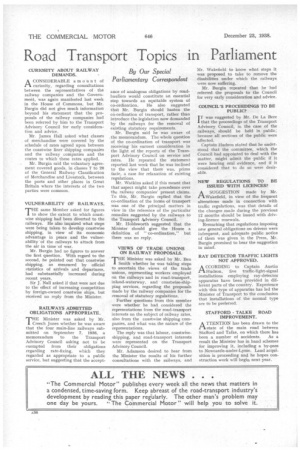Road Transport Topics in Parliament
Page 38

If you've noticed an error in this article please click here to report it so we can fix it.
By Our Special Parliamentary Correspondent
CURIOSITY ABOUT RAILWAY DEMANDS.
ACONSIDERABLE amount of curiosity, regarding consultations between the representatives of the railway companies and the Government, was again manifested last week in the House of Commons, but Mr. Burgin did not give much information beyond his statement that the proposals of the railway companies had been referred by him to the Transport Advisory Council for early consideration and advice.
Mr. James Hall asked what classes of merchandise were covered by the schedule of rates agreed upon between the coastwise liner shipping companies and the railway companies and the routes to which these rates applied.
Mr. Burgin said the voluntary agreement covered goods, in classes 7 to 20 of the General Railway Classification of Merchandise and Livestock, between the ports and other places in Great Britain where the interests of the two parties were common.
VULNERABILITY OF RAILWAYS.
THE same Member asked for figures to show the extent to which coastwise shipping had been diverted to the railways. He also inquired what steps were being taken to develop coastwise shipping, in view of its economic advantage in peace and the vulnerability of the railways to attack from the air in time of war.
Mr. Burgin had no figures to answer the first question. With regard to the second, he pointed out that coastwise shipping, as measured by official statistics of arrivals and departures, had substantially increased during recent years, Sir J. Nall asked if that were not due to the effect of increasing competition by foreign-owned coastwise ships, but received no reply from the -Minister.
RAILWAYS ADMITTED OBLIGATIONS APPROPRIATE.
THE Minister was asked by Mr.
Creech Jones whether he was aware that the four main-line railways submitted on September 7, 1936, a memorandum to the Transport Advisory Council asking not to be exempted from their obligations regarding rate-fixing, which they regarded as appropriate to a public service, but suggesting that the accept ance of analogous obligations by roadhauliers would constitute an essential step towards an equitable system of co-Ordination. He also suggested that Mr. -Burgin should hasten the co-ordination of transport, rather than introduce the legislation now demanded by the railways for the removal of existing statutory requirements.
Mr. Burgin said he was aware of -the memorandum. The whole question of the co-ordination of transport was receiving his earnest consideration in the light of the reports of the Trans port Advisory Council on service and rates. He repeated the statement reported last week that he was inclined to the view that there was, prima facie, a case for relaxation of existing regulations.
Mr. Watkins asked if this meant that that aspect might take precedence over the railway companies present claims.
To this, Mr. F3urgin replied that the co-ordination of the forms of transport was one of the principal matters in view in the reference of the particular remedies suggested by the railways to the Transport Ih,dvisory Council.
Mr. Holdsworth suggested that the Minister should give the House a definition of " co-ordination," but there was no reply.
VIEWS OF TRADE UNIONS ON RAILWAY PROPOSALS.
THE Minister was asked by Mr. Ben I. Smith whether he was taking steps to ascertain the views of the trade unions, representing workers employed on the railways and in roacbtransport, inland-waterway, and coastwise-shipping services, regarding the proposals made by the railway companies for the removal of statutory regulations.
Further questions from this member were whether he had considered the representations from the road-transport interests on the subject of railway rates, also from the coastwise shipping companies, and what was, the nature of the representations.
• The reply was that labour, coastwiseshipping, and road-transport interests were represented on the Transport Advisory Council.
Mr. Adamson desired to hear from the Minister the results of his further consultations with the railways, and Mr. Wakefield to know what steps it was proposed to take to remove the disabilities under which the railways were now suffering_ Mr. Burgin repeated that he had referred the proposals to the Council for very early consideration and advice. COUNCIL'S PROCEEDINGS TO BE PUBLIC?
IT was suggested by Mr. De La Bore 1 that the proceedings of the Transport Advisory Council, in the case of the railways, should be held in public, because all sections of the public were affected.
Captain Hudson stated that he understood that the committee, which the Council had appointed to deal with the matter, might admit the public if it were hearing oral evidence, and if it considered that to do so vere desirable.
NEW REGULATIONS TO BE ISSUED WITH LICENCES?
ASUGGESTION made by Mr. Wakefield, in view of the frequent alterations made in connection with traffic regulations, was that details of the changes made during the previous 12 months should be issued with driving-licence renewals.
Remarking that regulations imposing new general obligations on drivers were infrequent, and adequate public notice of them was given in the Press, Mr. Burgin promised to bear the suggestion in mind.
RAY DETECTOR TRAFFIC LIGHTS NOT APPROVED.
ACCORDING to Captain Austin Hudson, five traffic-light-signal installations employing ray-detector apparatus have been provided in different parts of the country. Experience with this type of apparatus has led the Minister of Transport to the conclusion that installations of the normal type are to be preferred.
STAFFORD.TALKIE ROAD IMPROVEMENT.
ATTENTION has been drawn to the state of the main road between Stafford and Talke, on which there has
been a number of accidents. As a result the Minister has in hand schemes for improving it, including a by-pass to Newcastle-under-Lyme. Land acquisition is proceeding and he hopes construction work will begin next year.




































































